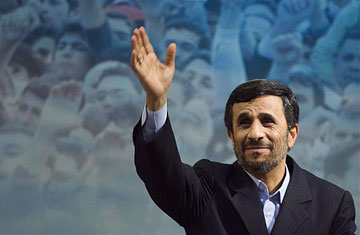
Iranian President Mahmoud Ahmadinejad waves to journalists after a news conference in Tehran
Will the monthlong U.N. review conference on the Nuclear Non-Proliferation Treaty (NPT), which kicks off in New York City on Monday, accomplish anything? Ironically, that depends largely on the world's most prominent non-proliferation scofflaw, Mahmoud Ahmadinejad. The Iranian President will try to divert attention from his country's nuclear program by accusing the major powers of failing to disarm. And he'll charge Israel with developing a formidable nuclear arsenal and dodging the treaty altogether. But his penchant for theatricality could end up hurting him.
For the Obama Administration, the conference is supposed to be the capstone of President Obama's careful, year-long reconstruction of international support for non-proliferation regimes. After years of scorn for international institutions under the Bush Administration, Obama hopes to create momentum for global restrictions on nuclear proliferation. At the same time, the Administration aims to rally support for sanctions against Iran in bilateral talks with U.N. Security Council member states on the sidelines.
Both goals will be hard to achieve. In private, senior Administration officials admit that the presence of the Iranians at a conference that makes decisions by unanimous consent means strengthening the NPT is not going to happen. Ahmadinejad is likely to focus attention on Israel's covert nuclear program and the fact that the U.S. applies only token pressure on Israel to sign on to the NPT. And while Washington argues that Iran is at odds with all the moderate states of the Middle East, Ahmadinejad's complaints about Israel's program could find support from some traditionally pro-Western countries. Egypt and Turkey, both of whom the U.S. would like to have on its side in tackling Iran, are outspoken critics of Israel's self-styled "nuclear ambiguity" — the fact that it neither confirms nor denies the existence of a weapons program.
The best hope for the Administration may come from Ahmadinejad himself: the Iranian leader has often proven to be his own worst enemy. Last fall in New York City at the U.N. General Assembly, he handed the U.S. a big win by fumbling the response to the revelation of a hidden nuclear facility in Iran. Over the summer, during the political crisis that followed his contested re-election, he likewise brought the international community together against him by blaming a global conspiracy for the demonstrations in Iran's streets.
An Ahmadinejad outburst could make a difference. The U.S. is avidly courting support from China and Russia for tougher U.N. sanctions against Iran. Over the past four weeks, participants in the talks tell TIME, the U.S. has made progress with both countries, and only two or three tough issues remain on which they are seeking agreement. Crazy behavior by Ahmadinejad might even soften the positions of Turkey and Brazil, two non-permanent members of the Security Council that insist on dialogue rather than new sanctions. Still, it may take more than the full wacko from Ahmadinejad this week to make a difference in the Iran nuclear standoff.
